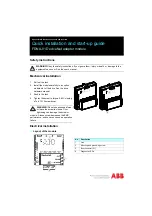
Instruction Manual
D104485X012
Vonk Choke Valves
September 2019
3
Installation
WARNING
Always wear protective gloves, clothing, and eyewear when performing any installation operations.
To avoid personal injury or property damage resulting from the sudden release of process pressure or bursting of parts, do
not install the valve assembly where service conditions could exceed the limits given in this manual or on the appropriate
nameplates. Use pressure‐relieving devices as required by government or accepted industry codes and good engineering
practices.
Check with your process or safety engineer for any other hazards that may be present from exposure to process media.
If installing into an existing application, also refer to the WARNING at the beginning of the Maintenance section in this
instruction manual.
When ordered, the valve configuration and construction materials were selected to meet particular pressure, temperature,
pressure drop, and controlled fluid conditions indicated when the valve was ordered. Because some body/trim material
combinations are limited in their pressure drop and temperature ranges, do not apply any other conditions to the valve
without first contacting your
1. Carefully remove the valve from the shipping package (box or pallet) avoiding any damage to the valve or, in case of
automated valves, to the electric or pneumatic / hydraulic actuator or instrumentation.
2. The valves are shipped with the ends protected with caps and a thin layer of protective grease. Before installing the
valve, remove the protective caps from the valve. Clean carefully and then de-grease both surfaces with a solvent.
Clean the inside of the valve to ensure there are no solid objects such as pieces of wood, plastic or packing materials
within the valve or on the valve seat. The valve must be free of all foreign matter.
3. Confirm that the materials of construction listed on the valve nameplate are appropriate for the service intended
and are as specified.
Vonk chokes valves can be mounted in any position. Installation of the valve must match the flow direction is indicated
by the arrow on the valve-body.
Unless otherwise recommended by Emerson:
1. The pipe ends must be properly aligned and supported so as to prevent the valve being subjected to unnecessary
stress induced by connecting piping.
2. It is recommended to perform piping flushing before installation of valve.
3. After the down-stream flange (outlet flange), the piping shall be straight over a certain length (depending on the
flow medium, the fluid phase and the pressure drop over the valve), but at least 1 meter (39-inches).
4. For choke valves provided with pneumatic actuators, the air pressure to the actuator shall be at least 4.5 bar (65
psi), and a maximum of 8 bar (116 psi), unless specified otherwise. Clean, dry compressed air can be used for the
actuator. If a valve positioner is used, instrument air has to be used; do not install a drip feed lubricator in the supply
line to the positioner.
5. During the installation of the valve, materials, such as connecting flanges, gaskets and bolting shall be used,
appropriate for the design conditions of the application.
6. If present, do not cover or stop up the drain channels located at the actuator top-flange of the bonnet.
CAUTION
Make sure that the operating limits of the valve are the same or higher than the operating limits of the piping system. See
the nameplate of the choke valve.








































